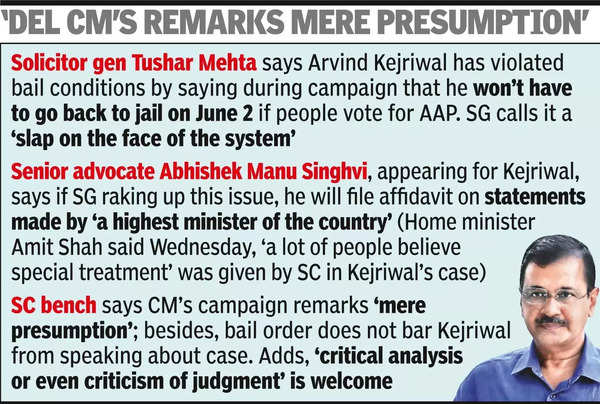A bench of Justices Sanjiv Khanna and Dipankar Datta said the court normally maintains judicial restraint until the case is very grave and there have been cases when the top court entertained pleas under Article 32. “He filed the case here but we did not open the gate. We refused to entertain his plea,” the bench said after solicitor general Tushar Mehta argued that allowing accused to challenge their arrest directly in high courts and the SC would be “disastrous” as everyone would rush to higher courts.
Coming a day after home minister Amit Shah’s statement that many people believed the bench of Justices Khanna and Datta favoured Kejriwal by giving him interim bail, the hearing saw interesting exchanges between Mehta and Kejriwal’s counsel, senior advocate Abhishek Manu Singhvi.

Alleging that the Delhi CM was misusing the liberty granted by the court, Mehta said Kejriwal’s campaign pitch was that he would not have to go back to jail on June 2 if people voted for AAP. The SG said his statement was “a slap on the face of the system”, leading the bench to say that it was his (Kejriwal’s) “mere presumption” and he had to surrender on the date fixed by the court.
Singhvi took exception to Mehta’s contention and told the court that he would file an affidavit regarding a statement made by “a highest minister of the country” about the SC’s order granting interim bail, a not-so-subtle reference to Shah’s comment.
Asking the lawyers to focus on legal issues, the bench said, “As far as critical analysis or even criticism of the judgment is concerned, it is welcome. There is no difficulty. You may have different viewpoints.”
During the hearing, the court said an ED officer had to take a holistic and balanced view before arresting a person and he could not consider only inculpatory evidence while ignoring material pointing to the person’s innocence.
“If one set of material collected by an investigating officer points toward guilt and can be arrested on that basis, but if there is another set of material showing that he is not guilty then the officer has to be fair and he has to consider both sets of material. But if he ignores another set of material, then would it not be a ground for the court to interfere? The decision of the officer would be subjective but it must be based on objective material,” the bench said.
